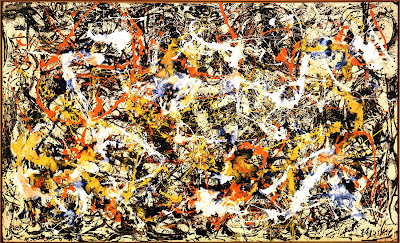 |
| Convergence by Jackson Pollock (1952) |
I often fall into the habit of putting Fashion under the same light of other subjects I find myself reading about. And in doing so, I've come to realise how easy can formed opinions be furiously dismissed. This comes to be interesting in Fashion contexts where everyone seeks to make 'statements' and at the end no one truly knows what anyone meant to say. Here I am anyways, trying to present my very own one.
Borrowing some of the thoughts of Henry Jenkins in the introductory chapter of his book Convergence Culture and merging them with my last inspection of London Fashion Week, this statement goes as it follows:
Fashion, as the current landscape may depict, finds itself in a highly contradictory state. Sometimes it seems to find itself at its best, but some others results to be an act of embarrassment. For instance, the work of young creatives becoming visibly accesible, the exploration of style self-expression through new media, or the spread use of new technologies in digital textiles, knitting, mass customisation and even DYI processes, seem to infere a more inclusive landscape. At the other edge, however, centralised capital in the form of luxury brands and fast fashion chains, expands its domain until every avenue in every city is saturated with their stores. And also as expected, centralised production in developing nations threatening life conditions and local entrepreneurship. Thus, either fashion celebration or condemnation, as postmodern theories proposed, are the only two perspectives of this complex capitalist phenomenon.
It is also clear at this state, that no industry is exempt of the technological, social and cultural change and for Fashion, although still held by the magic illusion of its lights, textures, patterns and colours, the last decade has signified more than superfluous changes. Digital technologies have lowered Fashion media production and distribution costs, expanded the range of delivery channels, and enable the audience to participate by appropriating and recirculating content in new ways; the power of the bloggers has never been so extended. But also, movingly conglomerations of media power into clusters work for the benefits of the same big corporations, and the once independent voice of bloggers now is commoditised by a culture of "freebies"started by luxury brands. These latter, dominating again all the media spectrum.
As Jenkins points out, no one seems capable of describing both set of changes at the same time and their impact upon each other. Some fear that the system is out of control, others that it is too controlled. Again, the truth lies somewhere in between.
